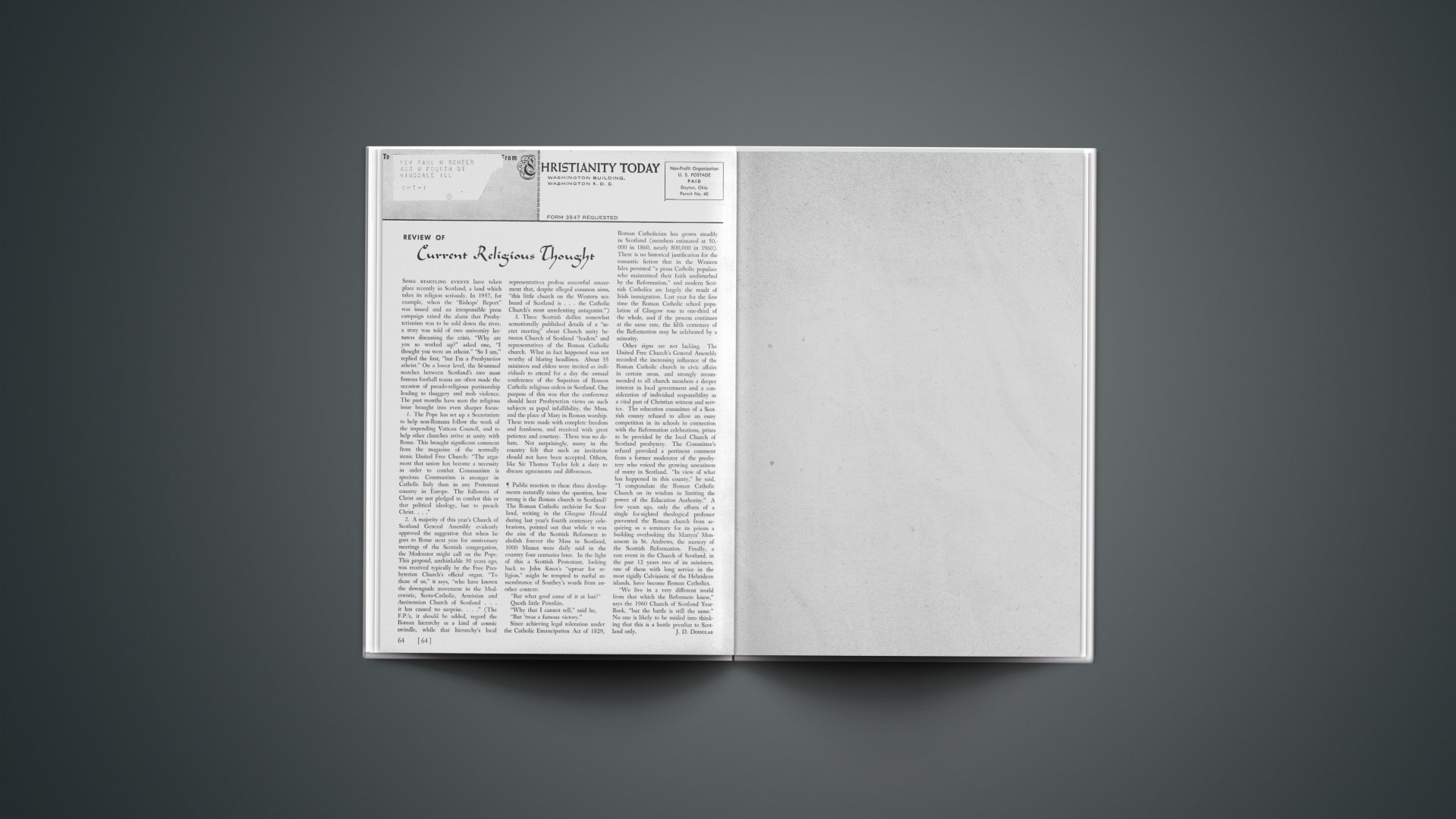Some startling events have taken place recently in Scotland, a land which takes its religion seriously. In 1957, for example, when the “Bishops’ Report” was issued and an irresponsible press campaign raised the alarm that Presbyterianism was to be sold down the river, a story was told of two university lecturers discussing the crisis. “Why are you so worked up?” asked one, “I thought you were an atheist.” “So I am,” replied the first, “but I’m a Presbyterian atheist.” On a lower level, the bi-annual matches between Scotland’s two most famous football teams are often made the occasion of pseudo-religious partisanship leading to thuggery and mob violence. The past months have seen the religious issue brought into even sharper focus:
1. The Pope has set up a Secretariate to help non-Romans follow the work of the impending Vatican Council, and to help other churches arrive at unity with Rome. This brought significant comment from the magazine of the normally irenic United Free Church: “The argument that union has become a necessity in order to combat Communism is specious. Communism is stronger in Catholic Italy than in any Protestant country in Europe. The followers of Christ are not pledged to combat this or that political ideology, but to preach Christ.…”
2. A majority of this year’s Church of Scotland General Assembly evidently approved the suggestion that when he goes to Rome next year for anniversary meetings of the Scottish congregation, the Moderator might call on the Pope. This proposal, unthinkable 30 years ago, was received typically by the Free Presbyterian Church’s official organ. “To those of us,” it says, “who have known the downgrade movement in the Modernistic, Scoto-Catholic, Arminian and Antinomian Church of Scotland … it has caused no surprise.…” (The F.P.’s, it should be added, regard the Roman hierarchy as a kind of cosmic swindle, while that hierarchy’s local representatives profess sorrowful amazement that, despite alleged common aims, “this little church on the Western seaboard of Scotland is … the Catholic Church’s most unrelenting antagonist.”)
3. Three Scottish dailies somewhat sensationally published details of a “secret meeting” about Church unity between Church of Scotland “leaders” and representatives of the Roman Catholic church. What in fact happened was not worthy of blaring headlines. About 35 ministers and elders were invited as individuals to attend for a day the annual conference of the Superiors of Roman Catholic religious orders in Scotland. One purpose of this was that the conference should hear Presbyterian views on such subjects as papal infallibility, the Mass, and the place of Mary in Roman worship. These were made with complete freedom and frankness, and received with great patience and courtesy. There was no debate. Not surprisingly, many in the country felt that such an invitation should not have been accepted. Others, like Sir Thomas Taylor felt a duty to discuss agreements and differences.
Public reaction to these three developments naturally raises the question, how strong is the Roman church in Scotland? The Roman Catholic archivist for Scotland, writing in the Glasgow Herald during last year’s fourth centenary celebrations, pointed out that while it was the aim of the Scottish Reformers to abolish forever the Mass in Scotland, 1000 Masses were daily said in the country four centuries later. In the light of this a Scottish Protestant, looking back to John Knox’s “uproar for religion,” might be tempted to rueful remembrance of Southey’s words from another context:
“But what good came of it at last?”
Quoth little Peterkin.
“Why that I cannot tell,” said he,
“But ’twas a famous victory.”
Since achieving legal toleration under the Catholic Emancipation Act of 1829, Roman Catholicism has grown steadily in Scotland (members estimated at 50,000 in 1860, nearly 800,000 in 1960). There is no historical justification for the romantic fiction that in the Western Isles persisted “a pious Catholic populace who maintained their faith undisturbed by the Reformation,” and modern Scottish Catholics are largely the result of Irish immigration. Last year for the first time the Roman Catholic school population of Glasgow rose to one-third of the whole, and if the process continues at the same rate, the fifth centenary of the Reformation may be celebrated by a minority.
Other signs are not lacking. The United Free Church’s General Assembly recorded the increasing influence of the Roman Catholic church in civic affairs in certain areas, and strongly recommended to all church members a deeper interest in local government and a consideration of individual responsibility as a vital part of Christian witness and service. The education committee of a Scottish county refused to allow an essay competition in its schools in connection with the Reformation celebrations, prizes to be provided by the local Church of Scotland presbytery. The Committee’s refusal provoked a pertinent comment from a former moderator of the presbytery who voiced the growing uneasiness of many in Scotland. “In view of what has happened in this county,” he said, “I congratulate the Roman Catholic Church on its wisdom in limiting the power of the Education Authority.” A few years ago, only the efforts of a single far-sighted theological professor prevented the Roman church from acquiring as a seminary for its priests a building overlooking the Martyrs’ Monument in St. Andrews, the nursery of the Scottish Reformation. Finally, a rare event in the Church of Scotland, in the past 12 years two of its ministers, one of them with long service in the most rigidly Calvinistic of the Hebridean islands, have become Roman Catholics.
“We live in a very different world from that which the Reformers knew,” says the 1960 Church of Scotland Year-Book, “but the battle is still the same.” No one is likely to be misled into thinking that this is a battle peculiar to Scotland only.










